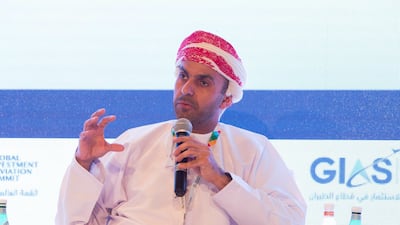Oman is in negotiations with several governments to manage and operate international airports for the first time as it seeks to boost its non-oil revenues.
The state-owned airports operator, which oversees four domestic terminals, is targeting long-term management deals for an additional six hubs internationally and locally, Aimen Al Hosni, chief executive of Oman Airports, told The National in Dubai. It expects to finalize an agreement for one international airport by the end of 2019.
"We’re in talks with certain governments, we’re in a very good stage with them and we’re hoping to see some light at the end of the tunnel before the end of this year for one airport," he said.
Oman is focusing on developing its aviation sector to diversify its economy beyond petrochemicals revenues. It is implementing phases of a strategy to boost visitor numbers to 11.7 million from 3.3 million currently and create 500,000 tourism jobs for Omanis by 2040. The Gulf state opened a new passenger terminal at Muscat International Airport in 2018 with capacity to handle 20 million passengers annually.
Muscat International handled 15.5 million passengers in 2018, a 10 per cent increase year on year, according to Oman Airports.
Focusing on the operation and management of more domestic hubs and adding international airports to its portfolio is part of the state-owned company's five-year growth plan.
"We’d like to upgrade our footprint, we’d like to get more foreign direct investment and we have the know-how that we can actually export and sell to other regions and countries."
Mr Al Hosni declined to identify the governments with which it is in talks for airport management contracts or the value of the agreement expected this year.
Oman Airports has also approached oil companies to run airports in oil fields in the south and west of the country, he said, declining to name them. Each airport has an annual passenger capacity of 150,000.
Oman Airports will sign a letter of intent for the management of one oilfield airport in February, he said, declining to disclose details.
"We’re going to take those airports because its our niche market, its our know-how," Al Hosni said.
Oman, the largest Middle east oil producer outside Opec, last year produced an average of oil and condensate of 992,000 barrels per day.
Oman Airports oversees Muscat International Airport and the smaller terminals of Salalah, Duqm and Sohar.
RESULTS
Men
1 Marius Kipserem (KEN) 2:04:04
2 Abraham Kiptum (KEN) 2:04:16
3 Dejene Debela Gonfra (ETH) 2:07:06
4 Thomas Rono (KEN) 2:07:12
5 Stanley Biwott (KEN) 2:09:18
Women
1 Ababel Yeshaneh (ETH) 2:20:16
2 Eunice Chumba (BRN) 2:20:54
3 Gelete Burka (ETH) 2:24:07
4 Chaltu Tafa (ETH) 2:25:09
5 Caroline Kilel (KEN) 2:29:14
What is the FNC?
The Federal National Council is one of five federal authorities established by the UAE constitution. It held its first session on December 2, 1972, a year to the day after Federation.
It has 40 members, eight of whom are women. The members represent the UAE population through each of the emirates. Abu Dhabi and Dubai have eight members each, Sharjah and Ras al Khaimah six, and Ajman, Fujairah and Umm Al Quwain have four.
They bring Emirati issues to the council for debate and put those concerns to ministers summoned for questioning.
The FNC’s main functions include passing, amending or rejecting federal draft laws, discussing international treaties and agreements, and offering recommendations on general subjects raised during sessions.
Federal draft laws must first pass through the FNC for recommendations when members can amend the laws to suit the needs of citizens. The draft laws are then forwarded to the Cabinet for consideration and approval.
Since 2006, half of the members have been elected by UAE citizens to serve four-year terms and the other half are appointed by the Ruler’s Courts of the seven emirates.
In the 2015 elections, 78 of the 252 candidates were women. Women also represented 48 per cent of all voters and 67 per cent of the voters were under the age of 40.
Learn more about Qasr Al Hosn
In 2013, The National's History Project went beyond the walls to see what life was like living in Abu Dhabi's fabled fort:
Company%20Profile
%3Cp%3E%3Cstrong%3ECompany%20name%3A%20%3C%2Fstrong%3ENamara%0D%3Cbr%3E%3Cstrong%3EStarted%3A%20%3C%2Fstrong%3EJune%202022%0D%3Cbr%3E%3Cstrong%3EFounder%3A%20%3C%2Fstrong%3EMohammed%20Alnamara%0D%3Cbr%3E%3Cstrong%3EBased%3A%20%3C%2Fstrong%3EDubai%20%0D%3Cbr%3E%3Cstrong%3ESector%3A%20%3C%2Fstrong%3EMicrofinance%0D%3Cbr%3E%3Cstrong%3ECurrent%20number%20of%20staff%3A%20%3C%2Fstrong%3E16%0D%3Cbr%3E%3Cstrong%3EInvestment%20stage%3A%20%3C%2Fstrong%3ESeries%20A%0D%3Cbr%3E%3Cstrong%3EInvestors%3A%20%3C%2Fstrong%3EFamily%20offices%0D%3Cbr%3E%3C%2Fp%3E%0A
Specs
Engine: Dual-motor all-wheel-drive electric
Range: Up to 610km
Power: 905hp
Torque: 985Nm
Price: From Dh439,000
Available: Now
BMW M5 specs
Engine: 4.4-litre twin-turbo V-8 petrol enging with additional electric motor
Power: 727hp
Torque: 1,000Nm
Transmission: 8-speed auto
Fuel consumption: 10.6L/100km
On sale: Now
Price: From Dh650,000


